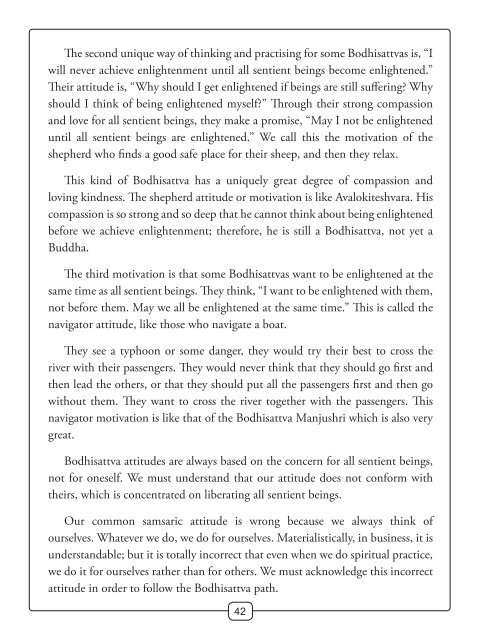Gyalsey_Laglen_v2_24092014_e-book
Gyalsey_Laglen_v2_24092014_e-book
Gyalsey_Laglen_v2_24092014_e-book
Create successful ePaper yourself
Turn your PDF publications into a flip-book with our unique Google optimized e-Paper software.
The second unique way of thinking and practising for some Bodhisattvas is, “I<br />
will never achieve enlightenment until all sentient beings become enlightened.”<br />
Their attitude is, “Why should I get enlightened if beings are still suffering Why<br />
should I think of being enlightened myself” Through their strong compassion<br />
and love for all sentient beings, they make a promise, “May I not be enlightened<br />
until all sentient beings are enlightened.” We call this the motivation of the<br />
shepherd who finds a good safe place for their sheep, and then they relax.<br />
This kind of Bodhisattva has a uniquely great degree of compassion and<br />
loving kindness. The shepherd attitude or motivation is like Avalokiteshvara. His<br />
compassion is so strong and so deep that he cannot think about being enlightened<br />
before we achieve enlightenment; therefore, he is still a Bodhisattva, not yet a<br />
Buddha.<br />
The third motivation is that some Bodhisattvas want to be enlightened at the<br />
same time as all sentient beings. They think, “I want to be enlightened with them,<br />
not before them. May we all be enlightened at the same time.” This is called the<br />
navigator attitude, like those who navigate a boat.<br />
They see a typhoon or some danger, they would try their best to cross the<br />
river with their passengers. They would never think that they should go first and<br />
then lead the others, or that they should put all the passengers first and then go<br />
without them. They want to cross the river together with the passengers. This<br />
navigator motivation is like that of the Bodhisattva Manjushri which is also very<br />
great.<br />
Bodhisattva attitudes are always based on the concern for all sentient beings,<br />
not for oneself. We must understand that our attitude does not conform with<br />
theirs, which is concentrated on liberating all sentient beings.<br />
Our common samsaric attitude is wrong because we always think of<br />
ourselves. Whatever we do, we do for ourselves. Materialistically, in business, it is<br />
understandable; but it is totally incorrect that even when we do spiritual practice,<br />
we do it for ourselves rather than for others. We must acknowledge this incorrect<br />
attitude in order to follow the Bodhisattva path.<br />
42


